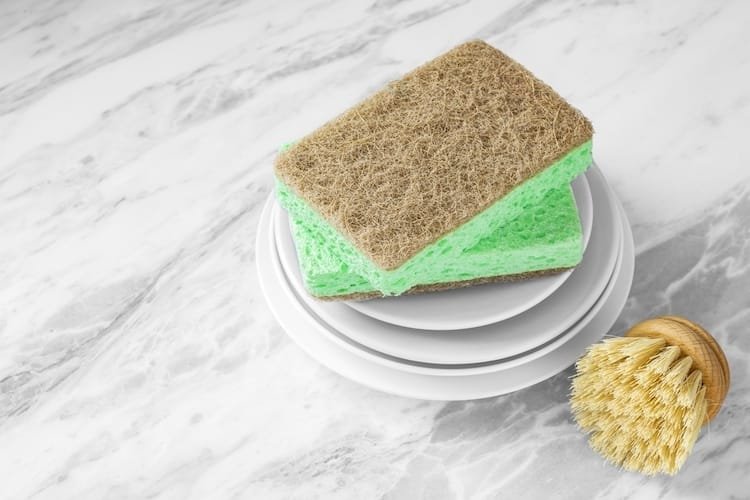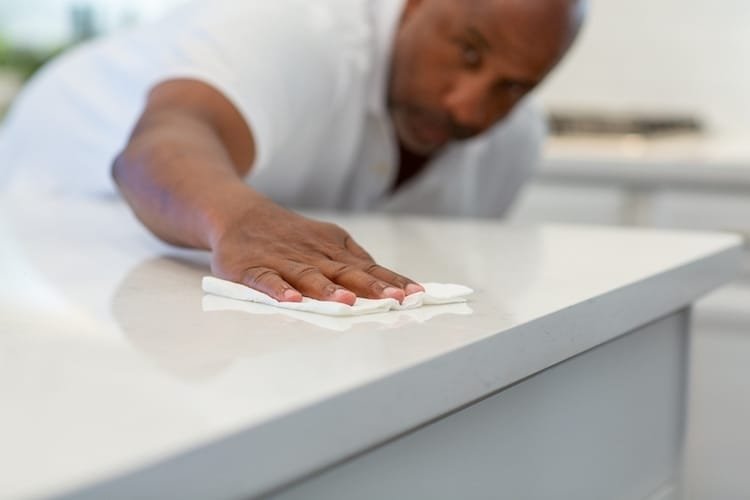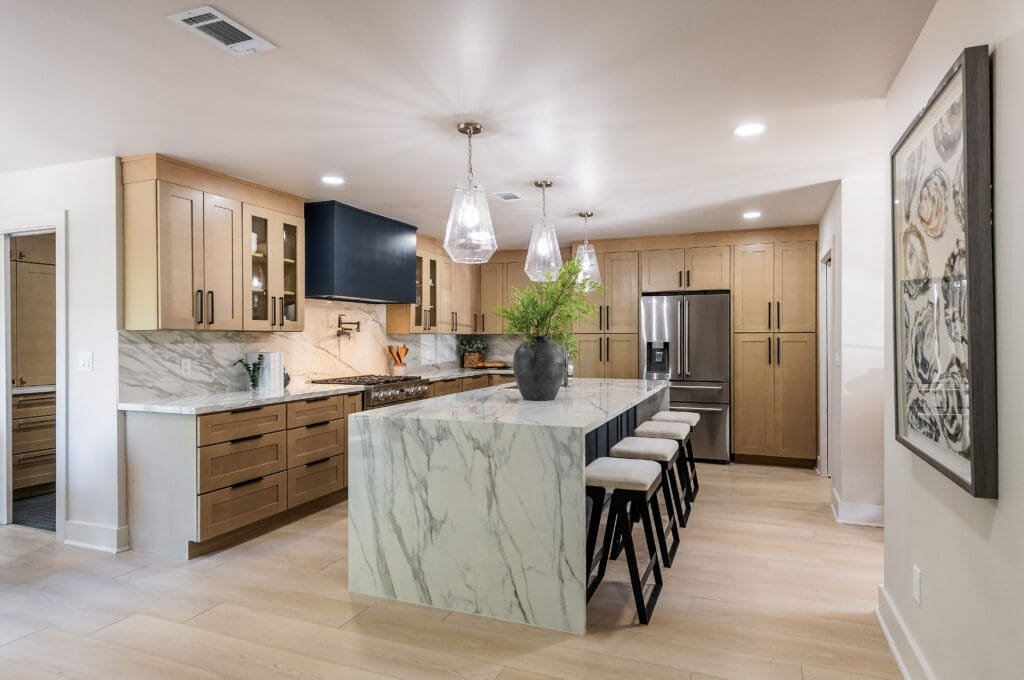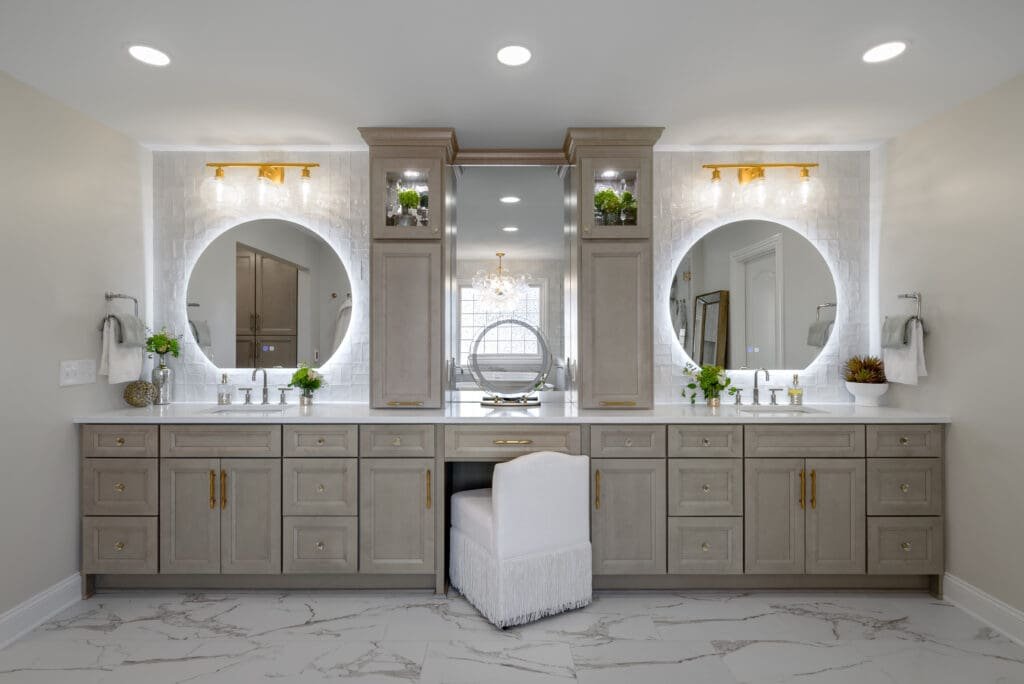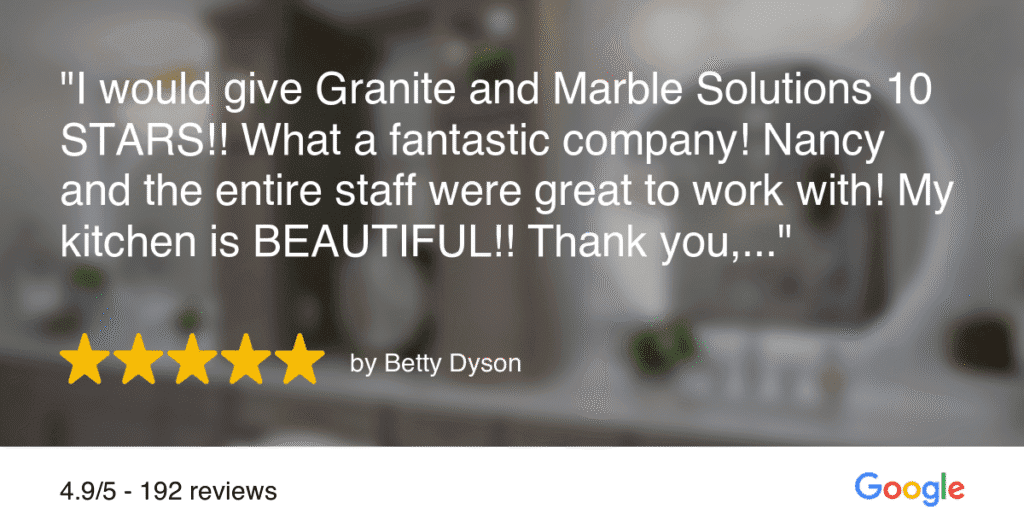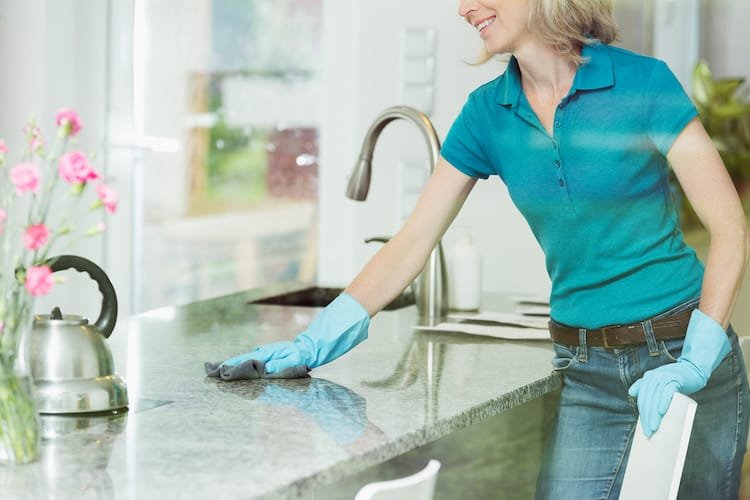
Keeping your stone countertops clean is essential for both aesthetics and hygiene. The most popular materials — granite, marble, quartz, quartzite, and porcelain — require specific care.
In this guide, we’ll cover how to clean kitchen countertops effectively, offering tips for daily upkeep and deep cleaning. You’ll learn about the best products and techniques for marble countertop care, granite countertop care, and more. Regular cleaning not only enhances the look of your kitchen but also extends the life of your countertops.
Ready to maintain a sparkling, well-maintained kitchen? Let’s dive into the best practices for keeping your countertops pristine.
Thinking about upgrading your kitchen? Request a free quote for a custom stone countertop today.
Understanding Your Countertop Material
Before diving into the specifics of cleaning and maintaining your kitchen countertops, it’s important to understand the unique characteristics of your counter material. Knowing what your countertops are made of will help you choose the right cleaning methods and products, ensuring you don’t accidentally damage your surfaces.
Granite: Granite is a durable and heat-resistant natural stone, making it a popular choice for kitchen countertops. However, it is porous, which means it can absorb liquids and stain if not properly sealed. Regular sealing and using pH-balanced cleaners are key to granite countertop care.
Marble: Known for its elegance and beauty, marble is a softer, more porous stone that’s prone to staining and scratching. It requires more delicate handling and specific cleaners to maintain its appearance. Marble countertop care involves using pH-neutral cleaners and avoiding acidic substances.
Quartz: Quartz countertops are engineered from natural quartz crystals mixed with resins. This makes them non-porous, stain-resistant, and low maintenance. While they don’t require sealing, it’s important to avoid harsh chemicals and high heat.
Quartzite: Combining the durability of granite with the aesthetic appeal of marble, quartzite is a natural stone that’s resistant to heat and scratching. Like granite, it’s porous and benefits from regular sealing and gentle cleaning products.
Porcelain: Porcelain countertops are highly durable and resistant to heat, stains, and scratches. They are non-porous and don’t require sealing. Cleaning porcelain is straightforward, but abrasive pads should be avoided to prevent surface damage.
Understanding these materials ensures you use the correct cleaning methods and products, preserving the beauty and functionality of your kitchen countertops. With this knowledge, you’re ready to dive into the best practices for keeping each type of countertop clean and well-maintained.
General Cleaning Tips for All Countertops
Maintaining clean kitchen countertops involves daily care and occasional deep cleaning. Here are some general cleaning tips that apply to all types of countertops, making sure they remain spotless and in good condition.
Daily Cleaning Routine
To keep your countertops looking their best, incorporate a simple daily cleaning routine. We recommend following these steps at the end of every day to wake up to a clean and beautiful kitchen.
- Remove debris and crumbs: Start by clearing away debris, crumbs, or loose dirt from the surface. Use a soft cloth or a handheld vacuum to ensure all particles are removed.
- Wipe with a damp cloth and mild soap: Mix a small amount of mild dish soap with warm water. Then, dampen a soft cloth or sponge with soapy water and gently wipe down the countertop. This helps remove any spills, grease, or grime accumulated during the day.
- Rinse with clean water: After wiping with soapy water, use another cloth dampened with clean water to rinse away any residue. This step is important to prevent any soap buildup that could dull the surface.
- Dry with a soft cloth: Finally, use a dry, soft cloth to thoroughly dry the countertop. Drying helps prevent water spots and keeps the surface shiny.
Avoid Harsh Cleaners and Abrasive Tools
Whether you’re giving your surfaces a daily wipe-down or doing a deeper clean, it’s important to avoid using harsh chemicals or abrasive tools that could damage your countertops. Avoid cleaners that contain bleach, ammonia, or other harsh chemicals, as they can damage the surface and degrade the sealant. Also, stick to soft cloths, microfiber towels, or non-abrasive sponges, and avoid using steel wool, scouring pads, or any abrasive tools that can scratch the surface.
Immediate Cleanup of Spills
Accidents happen, and when they do, it’s important to clean up spills immediately. Wipe up spills immediately to prevent staining, especially on porous surfaces like granite and marble. For liquid spills, blot the area with a soft cloth rather than wiping — this prevents the liquid from spreading and helps absorb it more effectively.
Granite Countertop Care
Granite kitchen countertops are known for their durability and natural beauty, making them popular in many homes. To keep them looking their best, here are some simple cleaning and maintenance tips you can follow that are tailored to granite’s unique properties.
Deep cleaning your granite countertops every few months will help maintain their shine and hygiene. Use a granite-specific cleaner that is pH-balanced for a more thorough clean. Spray the cleaner onto the countertop and let it sit for a few minutes to break down any stubborn grime. Then, using a soft cloth or non-abrasive sponge, gently scrub the surface in a circular motion to lift away dirt and residues. Rinse the countertop with clean water to remove any cleaner residue, then dry thoroughly with a soft cloth to restore the granite’s natural beauty.
Granite is porous, which means it can absorb liquids and stain if spills are not cleaned up quickly. Blot spills immediately with a soft cloth to prevent them from seeping into the stone, but avoid wiping, as this can spread the spill. For tougher stains, create a baking soda paste by mixing baking soda with a small amount of water. Apply the paste to the stain, cover it with plastic wrap, and let it sit for a few hours or overnight. Then, wipe away the paste with a damp cloth and dry the area.
Sealing granite countertops is essential to protect them from stains and damage. To check if your countertop needs sealing, all you need to do is sprinkle a few drops of water on the surface. If the water beads up, the seal is intact. If it soaks in, it’s time to reseal. Before sealing, ensure the countertop is thoroughly cleaned and completely dry. Use a granite sealer and follow the manufacturer’s instructions.
Typically, you spray the sealer onto the countertop, let it sit for the recommended time, and then wipe off any excess with a clean cloth. After the sealer has dried, buff the countertop with a soft cloth to enhance the shine and ensure an even finish.
Marble Countertop Care
Being a softer, more porous stone, marble is prone to staining and scratching, so if you have a countertop made of marble, you need to take extra care when cleaning. Here’s how to ensure your marble countertops stay in top condition.
Because marble is porous, it stains very easily. As with granite, you should blot spills immediately with a soft cloth rather than wiping to prevent the liquid from spreading. For tougher stains, a poultice can be very effective. You can make a poultice using baking soda and water to form a thick paste. Apply this paste to the stained area, cover it with plastic wrap, and let it sit for 24 hours. The baking soda will draw out the stain, and you can wipe away the paste and clean the area as usual.
Marble requires regular sealing to protect against stains and etching. Clean the countertop thoroughly before applying a marble-specific sealer according to the manufacturer’s instructions. Typically, you’ll apply the sealer, allow it to penetrate the surface for the recommended time, and then wipe off any excess. Buff the countertop with a soft cloth to finish.
Preventative care is another good way to improve a marble’s pristine condition. Use cutting boards to avoid scratches, and place trivets under hot pots and pans to protect the surface from heat damage. Also, using coasters under glasses can prevent rings from forming due to condensation.
Lastly, regular maintenance should include polishing the marble to restore its shine. You can use a marble polish or a mixture of baking soda and water. Apply the polish or paste, gently buff the surface in circular motions, and then wipe clean.
Quartz Countertop Care
Quartz countertops are popular for their durability, non-porous surface, and low maintenance needs, so it takes less work to keep them looking good. But all surfaces should be deep cleaned and polished from time to time — here’s the best way to give your quartz counter some TLC.
One of the benefits of quartz countertops is their resistance to stains. However, cleaning up spills as they happen is still good practice. For tougher spots or dried-on stains, a mix of water and alcohol can be effective. Apply the mixture to the stain, let it sit briefly, then gently scrub with a non-abrasive sponge. Rinse and dry thoroughly to ensure no cleaner residue remains.
One of the best things about quartz is that, unlike natural stone countertops, it does not need to be sealed. Its non-porous nature means it resists bacteria, mold, and mildew, making it a great choice for kitchen hygiene. It also simplifies long-term maintenance, as you don’t have to worry about periodic resealing.
However, quartz is not immune to damage from heat or harsh chemicals. Always use trivets or hot pads under hot cookware to prevent thermal shock and potential cracks. Avoid cleaners with bleach, ammonia, or other strong chemicals that could damage the resin in the quartz. Stick to pH-balanced or quartz-specific cleaners for best results.
Preventative care is key to keeping your quartz countertops looking their best. Always use a cutting board to prevent scratches, and place coasters under glasses to avoid potential stains from liquids. Although quartz is scratch-resistant, it’s not scratch-proof, so these small steps can go a long way. Lastly, regularly polishing your quartz countertops can help maintain their glossy finish. Use a quartz-specific polish or a mixture of mild dish soap and water applied with a soft cloth. Buff the surface in circular motions and wipe clean to keep the countertops gleaming.
Quartzite Countertop Care
Quartzite countertops offer the perfect blend of granite’s durability and marble’s aesthetic appeal. As a natural stone, quartzite is incredibly tough, heat-resistant, and can handle the daily wear and tear of a busy kitchen. Here’s how to keep it looking its best.
Quartzite is known for its resistance to heat and scratches, but it’s still wise to take precautions. Avoid placing hot pots and pans directly on the surface; instead, use trivets or hot pads to prevent potential heat damage. While quartzite is scratch-resistant, it’s not scratch-proof. Always use a cutting board to protect the surface from knife marks.
Stains can occur on quartzite if spills are not cleaned up quickly, especially from acidic substances like wine, coffee, or citrus juices. Blot spills immediately with a soft cloth to prevent them from seeping into the stone. For tougher stains, create a paste using baking soda and water. Apply the paste to the stain, cover it with plastic wrap, and let it sit overnight. The baking soda will help lift the stain, after which you can clean the area with a damp cloth.
As with other countertop materials, sealing quartzite countertops is crucial for maintaining their beauty and preventing stains. To check if your countertop needs sealing, you can do the same trick of sprinkling a few drops of water on the surface. If the water absorbs, it’s time to reseal. Clean the countertop thoroughly before applying a stone sealer according to the manufacturer’s instructions. Generally, you’ll apply the sealer, let it penetrate the surface for the recommended time, and then wipe off any excess. Buffing the surface with a soft cloth will enhance its shine and ensure an even finish.
Quartzite’s natural beauty and resilience make it a low-maintenance option, but regular checks and light maintenance are still necessary. From time to time, inspect your countertops for chips or cracks. If you find any, consider professional repair to prevent further damage.
Lastly, when it comes to everyday care, quartzite’s strength does not mean you can ignore good habits. Use non-abrasive cleaners and avoid harsh chemicals to keep the surface looking pristine. Products specifically formulated for natural stone are your best bet, ensuring the longevity of your custom quartzite countertops.
Porcelain Countertop Care
Porcelain countertops are a modern choice that combines beauty with outstanding durability. Known for their resistance to heat, stains, and scratches, porcelain surfaces are also non-porous, making them highly hygienic and easy to maintain.
One of the biggest advantages of porcelain countertops is their resistance to staining. However, it’s still good practice to clean up spills as soon as they occur to maintain the surface’s appearance. For more stubborn stains, a gentle abrasive cleaner can be used. Apply a small amount to the stained area, gently scrub with a non-abrasive sponge, then rinse thoroughly with water and dry the surface.
Unlike natural stone countertops like granite and marble, porcelain does not require sealing. Its non-porous nature means that it resists bacteria, mold, and mildew, simplifying long-term maintenance as there’s no need for resealing.
Heat resistance is another key benefit of porcelain — it should hold up fine to hot pots and pans. However, although porcelain is highly durable, sudden temperature changes can sometimes cause thermal shock, potentially leading to cracks, so if your pot is piping hot a hotplate might be your safest bet, just in case.
To prevent scratches and maintain the smooth surface of your porcelain countertops, always use cutting boards when preparing food. Porcelain is resistant to scratches, but avoiding direct cuts on the surface will definitely keep it looking flawless. Also, coasters should be placed under glasses and mugs to prevent potential rings from forming due to liquids.
Finally, your regular maintenance routine should include polishing the surface to enhance its natural shine. You can use a porcelain-specific polish or a mixture of mild dish soap and water. Apply the polish or soapy water with a soft cloth, gently buff the surface in circular motions, and then wipe clean. This will help maintain the countertop’s sheen and provide an extra layer of protection.
Transform Your Kitchen With Granite & Marble Solutions
Maintaining your kitchen countertops doesn’t have to be a daunting task. Whether you have granite, marble, quartz, quartzite, or porcelain, following proper care routines can keep your surfaces looking beautiful and extend their lifespan. Regular cleaning with mild products, immediate spill management, and understanding the specific needs of each material are key to preserving their beauty and functionality.
If you’ve read this post to decide which countertop material is right for your kitchen upgrade, we hope that our maintenance tips have shown you which option fits best with your household’s routine and needs. Now, are you ready to transform your kitchen with beautiful, durable countertops? Talk to us about our natural stone options.
Whether you’re interested in the classic elegance of marble, the robust beauty of granite, or the practicality of quartz, their expert team can help you choose the perfect custom countertop to suit your style and needs. Visit our showroom or explore our selection online and start your journey toward a more beautiful kitchen.
Request a free quote for your new custom stone countertop today.
